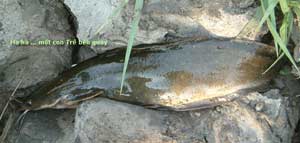What effect does the viscous substance on fish have?
Among aquatic species, some fish scales have degenerated, so their skin is directly exposed to the outside world.

Catfish are very viscous (Photo: 4so9)
On their skin there is a sebaceous gland, the cells in this viscous fluid can secrete a lot of viscous fluid, the viscous fluid spreading throughout the fish forming a viscous layer that makes their skin smooth.
The effect of this viscous fluid is very large: it has the effect of protecting the fish body, preventing the invasion of bacteria, toxic bacteria, parasites and other small organisms, preventing harmful substances entering the body, ensuring the normal survival of the fish.
For some fish, viscous fluid is also an effective tool to escape death. For example, on the body surface of catfish has a viscous fluid that makes it difficult for the enemy to catch it. The catfish also thanks to the new viscous fluid can easily wriggle in muddy water.
Lubricant fluids can also help fish grow. In the breeding season, male fish use viscous fluids to stick to plants to form fish caves. There are male fish that stick with bubbles that have been blown out right on the viscous substance to form foam blocks, the purpose is to let the females easily lay eggs, while the eggs are fertilized.
- The viscous balls are mysterious in the desert
- Fish oil has no effect on longevity
- The monster's self-defense moves make sharks shy
- Will kissing produce 200 times the morphine effect of morphine?
- Maximize the use of fish oil tablets
- Detection of 'stimulant' increases fertility
- Medicines for treatment from fish lettuce
- Miraculous fish fever in Cambodia
- Substance in fish oil restricts cancer tumors
- The most beautiful aquarium fish
- Discover interesting psychological effects
- Detecting a range of active ingredients with antiviral effect Zika
 Animal 'suffering' after hibernation
Animal 'suffering' after hibernation Why do goats climb well?
Why do goats climb well? Scientists were surprised to see chimpanzees eating turtles
Scientists were surprised to see chimpanzees eating turtles Giant catfish died deadly due to drought in Thailand
Giant catfish died deadly due to drought in Thailand